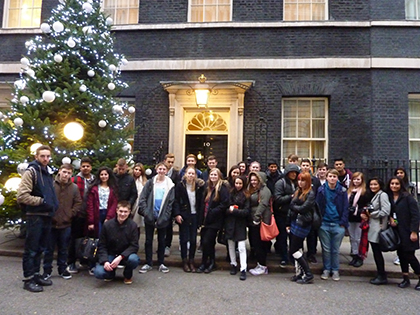Why study Politics?

- Politics is at the heart of everything we do. It is inspiring, exciting and relevant. It is never dull or predictable.
- You will learn to identify political arguments, weigh evidence against opinion and come to understand how your life is affected by political activity and appreciate why politics matters.
- You will explore topics such as why people vote for particular parties – is it the media, their class or the appeal of leaders? Turnout in General Elections in recent years has been in decline but was very high in the Scottish Referendum – what does that tell us about participation in politics?
- The course could hardly be more relevant as you find out what the political parties stand for and their role in the political system and, as more citizens take to the streets, you will consider whether protest is effective and how pressure groups can influence policy.
- You will also examine the ‘nuts and bolts’ of our political system; the power of the Prime Minister, the role of Parliament and the relationships between Politicians and Judges.
- You will also explore the ideological traditions in British Politics.
- In the second year, you will study the Politics of the United States and use this to complete a comparative study with the UK.
Why study Politics at Solihull Sixth Form College?
- You will share a classroom with learners from a wide diversity of backgrounds and political views and you will be encouraged to explore different perspectives, challenge your assumptions and formulate your own opinions.
- Politics groups quickly develop a community, being keen to share their understanding and debate ideas together beyond the classroom.
- You do not have to know much (or anything) about politics already but you should be curious and interested in discovering why, how and where decisions are made.
- You will have the opportunity for independent study utilising traditional and new media, the press, journals, television, radio and podcasts. Success requires learners to take an interest in current affairs and to read and listen widely.
- Trips are usually organised to Parliament, which can significantly boost students’ understanding.
- There may be the opportunity to attend masterclasses and university taster events at local Russell Group universities.
- The subject area utilises a variety of teaching methods. These include lectures, discussions, group work, student presentations, video material, study packs, IT-based activities, trips and visits and guest speakers.
Course Outline
This course investigates UK politics, UK government, Political Ideas and Comparative Politics. There are three broad areas of study in this specification:
The government and politics of the UK
• Democracy and participation, political parties, electoral systems, voting behaviour and the media.
• The constitution, parliament, Prime Minister and executive, relationships between the branches.
The government and politics of the USA (for the comparative politics topic)
• The US Constitution and federalism, US Congress, US presidency, US Supreme Court and civil rights, democracy and participation, comparative theories.
Political ideas
• Conservatism, Liberalism, Socialism and Anarchism.
Assessment
No Coursework
Examination (100%) – Assessment is at the end of the two year course through three two hour papers. The questions will require students to write essays, some of which draw upon source material.
Examining Board – Edexcel.
Special Entry Requirements
Standard A level entry requirements apply.
Prohibited Options
None.
What do our learners go on to do?
This subject is appropriate for those intending to study Social Sciences at University. It is also a very useful subject for a wide range of careers including law, journalism/media, the civil service, many areas of management and of course the world of politics itself. Our experience indicates that a variety of employers in both the private and public sectors value the qualification.
Cost Implications
Trips are usually organised to Parliament and there may be some costs to cover travel to London.
Complementary Subjects or Enrichment Courses
Politics combines well with other Social Science and Humanities courses such as, Economics, History, Philosophy, Sociology, Law, and Criminology. Equally, Politics complements science or arts subjects to create variety and interest programmes of study.
Several politicians usually visit the College each year and those learners wishing to study politics at university can join the Social Science Academy which includes the opportunity to gain the Extended Project Qualification, well thought of by admissions tutors in higher education.
This information is correct for September 2024 entry.

